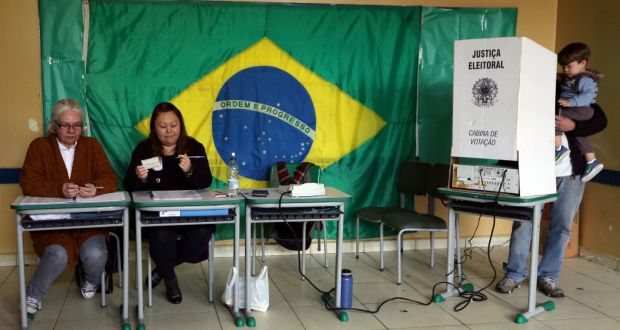
“Fake news,” or disinformation, has become a global concern. Democratic governance works best with an informed, discerning electorate. But what happens when the electorate consumes false information? What happens when popular news stories contain half-truths and half-fictions?
As Latin America heads into an electoral super cycle that only happens once every 12 years, a priority for governments is countering the threat posed by disinformation. In Brazil, the largest economy in Latin America and the United States’ third largest trading partner in the hemisphere, 92 percent of citizens identify false web content as a problem ahead of elections in October. These elections will be the most important since Brazil’s return to democracy in 1985 and will undoubtedly have a regional impact. Brazil’s corruption scandal continues to touch several countries in Latin America. As a key US trade partner, it is still recovering from a steep recession and a volatile election could affect economic prospects. Overall, Brazilians need to figure out how to minimize the spread of false content, restore trust in institutions, and do so consistent with democratic liberties. The following list discusses three points to keep in mind when looking at disinformation in Brazil.
Disinformation threatens democratic integrity
Many in Brazil rely on social media for news. Sixty-four percent of Brazilians share news via social media and access the internet through a smartphone. Over half of Brazil is connected on Whatsapp and 35 percent of users rely on it as their primary source of news. Such platforms and smartphones augment the tendency of news to spread quickly and anonymously to large groups. That means that those spreading false content have a higher chance of real impact, outside any editorial oversight and largely untraceable.
Institutional distrust makes disinformation easier
Not only do people interact with social media for news, but Brazilians also trust social media more than professional media or government. Brazil’s largest newspaper, Folha de S. Paulo, recently decided to forego updating its Facebook page after an analysis of Facebook pages covering Brazilian news showed a rising tendency for users to interact primarily with fake content. Twenty-one of the 72 pages were “fake news” and 51 were professional news media. Over three months, user interactions with credible media outlets decreased by 17 percent, while engagement with “fake news” sites increased by over 60 percent.
Brazil’s response is worrisome, but at least they are responding
In the lead up to the 2018 elections, Brazilian officials are struggling with how to respond to the country’s vulnerability to disinformation while protecting free speech. The Federal Police (FP) and the Supreme Electoral Court (TSE) created a working group in December 2017 to confront the issue. There are fears that the FP will resort to a law dating from the country’s military dictatorship era to censor content. A bill introduced in the Senate proposes prison sentences ranging from six months to three years for spreading “fake news.” Tech companies and the various branches of government have begun meeting to discuss creating a manual for judges on identifying fake news as well as an information booklet for voters. Initiating dialogue with the private sector and exploring legal frameworks are good first steps, but more must be done to reconcile policy and legal responses to bridge the gap between containing disinformation and protecting freedom of expression.
Disinformation threatens all democracies. Many, including the US, Germany, Czech Republic, and France, face this challenge and all struggle to respond. While disinformation is not a new problem, today people are more cognitively vulnerable to it because of high distrust in traditional media and the ease with which information spreads. Governments facing this threat should approach it with respect for fundamental liberties in mind.
- Efforts should be made to educate citizens on how to identify fake news.
- Governments should collaborate with the private sector on how to present content to minimize confusion between factual reporting, personal opinion, and satire.
- Civil society needs to work with government, citizens, and the private sector to monitor media and call out government infringement.
- Government, civil society, and the private sector should collaborate on policies that ensure fundamental liberties while protecting democratic principles.
Disinformation is a hard challenge. If Brazil gets it wrong, the country’s democratic integrity is at risk, as an ideal and in practice.
Top